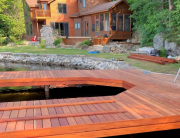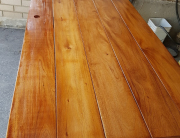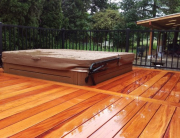Top 5 Sustainable Decking Materials
Sustainable Deck Materials: An Overview of Options
When it comes to being sustainable and reducing our collective carbon footprint, many of us have the basics down. We recycle, we compost, and we turn off the tap while we brush our teeth. The little things really add up, but one area in which consumers can become more eco-minded is in selecting sustainable deck materials for their homes. So when it comes to building a beautiful deck, here are some of the options you’ll hear discussed most often and an overview of their features and sustainability.
-
Natural soft or hardwood
Responsibly sourced wood is always going to be a great option for sustainable deck materials. If you’re looking for a truly classic look, a hardwood deck made of genuine mahogany is long lasting, rot resistant, and sustainable. There are also other ways to incorporate hardwood into your deck plans, such as using reclaimed wood that would otherwise be discarded. Softwood options, like redwood and cedar, are popular and, depending on your location, can be a lot cheaper. As popular decking wood, like mahogany and cedar, are in high demand, it is important to make sure you get something not only affordable, but sustainable.
If sustainability, longevity, beauty, and affordability are things you care the most about, contact Green World Lumber to get a quote on your decking material so you can get started!
Be sure to do plenty of research on where and how your deck wood is sourced to ensure it is your most sustainable option.
-
Accoya
Accoya decking is both relatively new, as well as unique when it comes to decking materials. By treating the wood with a chemical called acetic anhydride, Accoya producers are able to remove the molecules that are most attractive to the microorganisms that cause decks to rot by creating a wood that cannot readily absorb moisture and is completely solid. Be careful to thoroughly go over fasteners and glues before starting an Accoya project, however, as small amounts of the treatment process byproducts that remain in the wood will cause galvanized steel to corrode more quickly. While accoya is definitely sustainable, it is unreasonably priced as few suppliers exist in North America. Above ground it has a great 50 year lifespan but once in contact with the ground, (like your deck’s substructure) it only last 25 years. This means you would have to rip up your deck not matter how great it looks. On an average cost per year, it eclipses the cost of genuine mahogany and even ipe!
-
Kebony
Another newer option, Kebony has started to crop up more and more in discussions about sustainable wood. Its manufacturers use a softer wood to start, and then treat it to make the wood harder and more similar to natural hardwood. This produces a darker wood that looks very similar to hardwood decking options and will fade to grey over time. Though it is important to note that it is still a softwood, so take that in mind when brainstorming decking options. Kebony can be difficult with staining and cleaning products, so be sure to review the manufacturer’s recommendations before taking it on so you can have an idea of the full scope of the maintenance involved. Kebony is an attractive option if you are looking for a wood that can be less expensive than ipe, but still more expensive that most other reliable and sustainable decking materials.
-
Aluminum
Aluminum is a long lasting deck material that can also be recycled again after it’s reached the end of its life. Many aluminum decks can be finished to resemble natural wood as well. That being said, it definitely does not feel like wood when you walk on it and could produce a clatter sound depending on your installation. They’re certainly a low-maintenances option, but are not a naturally produced. They can also be a bit more challenging to find and require professional installation.
-
Pressure-Treated Wood
Pressure treated wood can be a great option for building a sustainable deck. Treated to resist rot, mold, and insects, these decks can be quite long-lasting and often less expensive. These decks can also be treated with borate, which is the only non-toxic treatment option for pressure-treated wood, that will help preserve the wood.
Choosing the Right Sustainable Deck Materials
Ultimately, choosing sustainable deck materials is a decision that will factor in a lot of variables, including your lifestyle, budget, and personal tastes, but hopefully this will give you a solid overview of some of the more commonly seen options to start your search. While there are some great options to consider, hardwoods make a reliably sustainable choice as they are naturally produced, can be reclaimed at the end of their life, and are ultimately biodegradable.
If you want to talk with someone at Green World Lumber about the sustainability of genuine mahogany against some of the other items in this list, do not hesitate to contact us and we would be happy to chat you!





